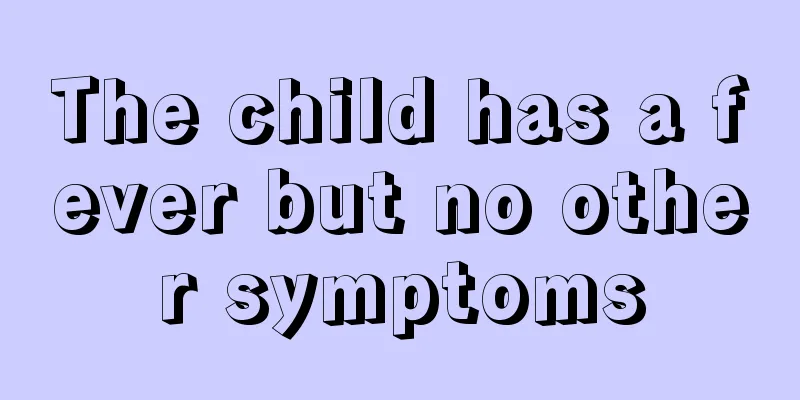What can children eat to treat constipation?

|
Some babies eat very little every day. When this happens, all the liquid is absorbed by the body after the food is digested, so the stool becomes very small and very dry. When the sugar content in breast milk is insufficient, the baby's gastrointestinal motility will slow down, making constipation more likely to occur. Constipation in children is also a common disease and must be treated promptly, otherwise the baby will feel very uncomfortable. Constipation is often caused by changes in bowel movement patterns, which refers to dry, hard stools, obstruction, long intervals between bowel movements (>2 days), or inability to defecate despite the urge to do so. symptom 1. Dry stool: The children have fewer bowel movements, dry and hard stools, difficulty defecating and anal pain. Sometimes feces abrades the intestinal mucosa or anus and causes bleeding, and the surface of the stool may contain a small amount of blood or mucus. Because feces stay in the intestines for too long, it can also reflexively cause systemic symptoms, such as loss of appetite, fatigue, dizziness, headache, and loss of appetite. Long-term insufficient food intake may lead to malnutrition, further aggravating constipation and forming a vicious cycle. If feces stays in the rectum for too long, it can cause local inflammation and a feeling of falling. Sometimes children with constipation often feel the urge to defecate but cannot do so, which increases the number of bowel movements. In severe constipation, stool is locally impacted and intestinal secretions may involuntarily flow out around the dry stool, which is similar to fecal incontinence. Constipation is a common cause of colic. 2. Abdominal distension and abdominal pain: The patient feels abdominal distension, dull pain in the lower abdomen, bowel sounds and excessive flatulence. Occasionally, children with severe constipation often experience sudden abdominal pain and begin to pass hard stools, followed by foul-smelling loose stools. Traditional Chinese medicine calls this "heat accumulation and side flow." 3. Rectal prolapse: Long-term constipation may lead to hemorrhoids or rectal prolapse. What food is good to eat? 1. Laxatives Bananas are a laxative food. Parents must be careful when purchasing bananas. Naturally ripe bananas have a good laxative effect. If babies eat them, mothers can make fragrant banana porridge to help their babies digest. Other juices such as orange juice, red date juice, cabbage juice, etc. are also effective. 2. Food supplement When babies are constipated during the weaning period, complementary foods can be added. In addition to highly nutritious eggs, lean meat, liver and fish, vegetables, fruits and porridge with high fiber content, such as spinach, rapeseed, cabbage, celery and pears, should also be added. 3. Honey Honey is also used by the people to relieve constipation. In fact, honey must be mixed with cold water to be effective; warm water is ineffective. Therefore, it is not advisable to give honey to infants and young children too early. One reason is that when children are young, parents are often not sure whether their children have allergies or are allergic to certain substances (such as seafood, pollen, etc.). Honey contains pollen. If a child has an allergic constitution, giving the child honey may easily cause allergies. Secondly, because the child's resistance is too weak, some children will catch a cold if the honey is mixed with cold water. Therefore, it is best to wait until the child is older and make sure that the child is not allergic to pollen before giving the child honey. Four: Cereals and grains When children are constipated, whole grains can help prevent and treat constipation. Parents should urge their children to defecate in time after breakfast and dinner. The time of each defecation should not be too short, and the children should try their best to excrete all the feces in their bodies. Children should be encouraged to develop good toilet habits every day to prevent constipation. If necessary, medication can be used to help children treat constipation. |
<<: What to eat for constipation in 3-year-old children?
>>: What should I do if my child has a fever for three consecutive days?
Recommend
What should I do if my child has cough and asthma?
Asthma is a very common disease that can affect b...
What should I do if my child has phlegm?
When a baby has a cold or respiratory disease, it...
Four and a half year old baby wets the bed
Bedwetting in children is a distressing issue for...
What are the harms of masturbation to teenagers
Adolescents are in an important period of physica...
What should I do if my 1-year-old baby has colic?
When the baby reaches one year old, he can basica...
How to make a baby with fever sweat
Mothers must have experienced the situation where...
What medicine should children use for nebulization
If a baby is sick when he is young, it is very tr...
What are the sequelae of cerebral palsy?
What are the sequelae of cerebral palsy? Some dis...
Why are deciduous teeth lost early?
Deciduous teeth are a child’s first set of teeth....
Why does my baby's knees make a crackling sound when he moves them?
People need to pay attention to the baby's jo...
The main harm of beating and scolding children
Some parents have a bad temper. When their childr...
Why does my baby always wake up when sleeping?
People who become mothers for the first time prob...
There is a white spot on the child's face
If a child has a white patch on his face, this is...
Symptoms of Japanese encephalitis in children
In clinical medicine, there are many diseases tha...
Male baby's genital head is red and swollen
The main difference between boys and girls is the...









